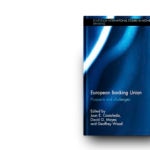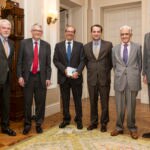José Manuel González-Páramo: "The EU is more necessary today than ever"
In a meeting organized by the Rafael del Pino Foundation to discuss the future of Europe, José Manuel González-Páramo said that the “European Union is more necessary today than ever” to rise up to find a solution to the Old Continent’s most pressing issues. According to BBVA’s Executive Board Director, the EU now faces the challenge, but also the opportunity, to plot its future without the UK, one of its traditional and more important, partners.
On the financial plane, BBVA’s Executive Board Director highlighted the EU’s achievements in its path towards building a banking union. However, he warned about the need to keep moving ahead with the reforms and completing the following stage in the process: the rollout of the EDIS, the European Deposit Insurance Scheme.

In the meeting, entitled The future of the European Banking Union and the City of London after Brexit, José Manuel González-Páramo was joined by Juan Castañeda and Pedro Schwartz and the general manager and cofounder of the Official Monetary and Financial Institutions Fund (OMFIF), David Marsh. The debate revolved around the ideas set out in the European Banking Union: prospects and challenges, a book coordinated and co-authored by Juan Castañeda.
The role of the banking union supporting euro 2.0
Regarding the origin of the European Banking Union, José Manuel González-Páramo explained that, at the time, it was clear that to ensure the sustainability of the euro “it needed to be completed with something more.” That is why, today, we have a “euro 2.0 supported by the banking union.” Thus, this union achieves three things: first, as a result of the union, all banks are now subject to the same regulations and supervision; the second, still under development, that depositors are covered by the same guarantees; and third, that, in case of bankruptcy or winding up, banks are subject to the same resolution scheme, regardless of the country where they are based, to ensure that creditors - and not taxpayers - bear the cost of any eventual bailouts.
But the banking union, in his opinion, is still far from being complete. “It’s still a work in progress,” said BBVA’s Executive Board Director. “We still have very important things to do, such as setting up the insurance scheme for the bank resolution fund and a mutualized co-insurance deposit fund.”
To this regard, Juan Castañeda emphasized that “commitment of EU institutions to the banking union will be put to the test during the next crisis.” On the other hand, Pedro Schwartz added that “we are already in the midst of an euro crisis” and Europe is having a hard time solving it.

From left to right: Professor of Economics, Amadeo Petitbó; general manager and cofounder of the Official Monetary and Financial Institutions Fund (OMFIF), David Marsh; BBVA’s Executive Board Director, José Manuel González-Páramo; economists Juan Castañeda and Pedro Schwartz; and current Director of the Rafael del Pino Foundation, Vicente J. Montes Gan
Europe’s future
González-Páramo noted that “we’ve taken a giant step towards building a more solid and stable European.” He also devoted some time to talk about the movements that – like the brexit supporters in the UK - are questioning some fundamentals on which the EU was built, such as free trade and the free flow of capitals or people.
“Brexit is currently in a definition stage,” said BBVA’s Executive Board Director. Whatever formula is chosen for its departure, “the United Kingdom will still be neighbor; the United Kingdom is Europe; it is a country with which we should still get along as best as we can, because of both what it represents, its history, and its cultural contribution to other European countries.”
Regarding the challenges that European Union is facing after the brexit, and in an ever-changing political environment, González-Páramo considers that it is essential to view the current climate of debate about the European project as a “great opportunity for Europe to take a stand as a firm advocate of free trade and multilateralism,” but “acknowledging that there are different visions of Europe” within the continent.
Also, considering the brexit as an opportunity, even a beneficial outcome for certain countries, David Marsh made reference to the competition between several European capital cities – including Paris, Milan, Amsterdam, Frankfurt or Madrid - to attract corporate and institutional headquarters, in order to replace London as Europe’s top financial hub. One of the strengths of the Spanish capital, according to Marsch, are its connections with emerging markets, such as Latin America.